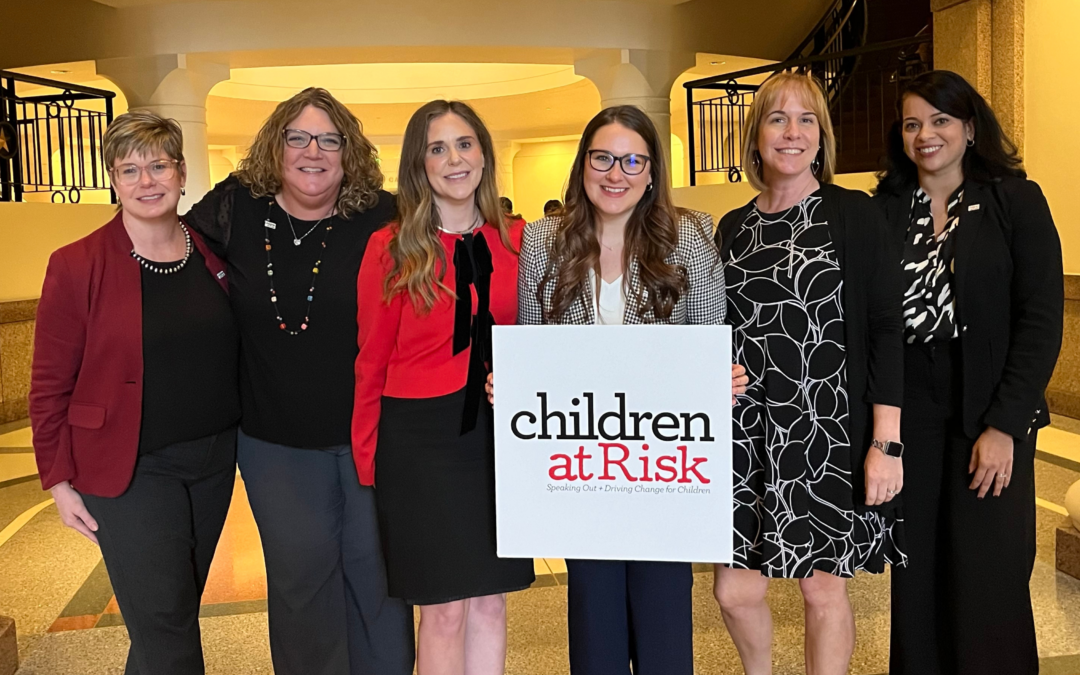Caroline Roberts, JD, General Counsel & Senior Director of Public Policy with CHILDREN AT RISK, testifies in support of SB 941/ HB 451 during the March 25, 2025 Texas House Licensing & Administrative Procedures Committee Hearing.
ADVOCATING IN SUPPORT OF SB 941/HB451
Texas can do more to protect its children from human trafficking.
Until Texas chooses to identify the children most vulnerable to human trafficking, it cannot and will not stop trafficking. To address the identified gaps and enhance our response to human trafficking, Texas must pass legislation to require that all youth involved with the juvenile justice and child welfare systems be screened for signs of human trafficking. Department of Family and Protective Services and Texas Juvenile Justice Department already have access to tools to screen for human trafficking. Universal screening will ensure that every youth in the state’s care who is a past or potential future victim of human trafficking is identified and can receive targeted services.
Human trafficking remains a persistent issue in Texas, disproportionately impacting the most vulnerable segments of our population, including children in the state’s foster care and juvenile justice systems. Children who are under the care of these systems are particularly susceptible, highlighting a critical need for a more robust and coordinated response to prevent human trafficking and a responsibility for the State of Texas.
According to the U.S. Department of Health and Human Services’ Administration for Children and Families, up to half of child sex trafficking victims have spent time in the foster care system. The traumas and challenges that lead children into these systems, such as abuse, neglect, and instability also increase their vulnerability to human trafficking. These children often lack stable support networks and may be more easily manipulated by traffickers who exploit their need for basic life necessities, money, care, and protection. These factors underscore the urgent need for targeted interventions and comprehensive support.
DFPS and TJJD have recognized this issue and have selected the Commercial Sexual Exploitation Identification Tool (CSE-IT) as a validated, universally applicable screening tool for those 10 and up. Despite these efforts, the data reveals a troubling gap in the implementation of this screening tool. Currently, TJJD is working on implementing universal screening for all children in their care. DFPS’s policy is that youth aged 12 years or older in DFPS conservatorship, who have experienced five or more placements with no known sex trafficking victimization and no missing events in the last 12 months, should be screened if they have not had a CSE-IT completed in the past year. Youth at High Risk, defined as those 10 years or older in DFPS conservatorship recovered from a missing or runaway episode, should be screened at recovery. In addition, DFPS’s policy is that they screen children aged 10 and older who are part of a Sex Trafficking (SXTR) investigation.
According to data provided by Allies Against Slavery’s Lighthouse platform, DFPS identified 371 suspected or confirmed victims of sex trafficking in 2022 through their investigations, yet only 332 children total were screened that year.4 This is only .8% of the children in foster care for that year (38,294) and less than the total number of children that were found to be likely victims of trafficking by DFPS’s own investigations. For those systems involved children that score a clear concern, the Governor’s Sex Trafficking Team has put together Commercial Sexual Exploited Youth (CSEY) Advocacy Care Coordination teams that cover 95% of the state. These children could receive the supports they need to heal, but they first need to be identified.
THE PROBLEM
- High Vulnerability: Children in foster care and juvenile justice systems are highly vulnerable to human trafficking, with up to half of child sex trafficking victims previously in foster care.
- Instability and Manipulation: These children often face abuse, neglect, and instability, making them easy targets for traffickers who exploit their need for basic life necessities and emotional support.
- Inconsistent Screening: Despite existing tools like the Commercial Sexual Exploitation Identification Tool (CSE-IT), there is a significant gap in the uniform application of these tools across different agencies.
THE IMPACT
- Increased Risk: The lack of consistent screening and identification means many vulnerable children are not receiving necessary interventions, increasing their risk of exploitation.
- Missed Interventions: Without uniform screening, children who could benefit from targeted services and supports might not be identified, leading to continued cycles of abuse and exploitation.
THE SOLUTION
Universal Screening Requirement: The bill proposes mandatory screening for all youth in juvenile justice and child welfare systems to identify those who are or might become victims of human trafficking.
Enhanced Coordination and Support: By mandating the use of a validated screening tool (CSE-IT), the bill aims to improve communication across agencies and ensure that identified children receive appropriate interventions.
Data-Driven Approach: Implementing universal screening will provide better data, which can be used to enhance training and awareness among frontline workers, ultimately increasing the effectiveness of interventions.
This legislation seeks to create a more protective environment for vulnerable children by standardizing and expanding the use of effective screening tools across all relevant state agencies, thereby ensuring that children at risk are identified and supported as early as possible.
READ MORE FROM C@R

C@R Hosts State of Disconnection Legislative Briefing on Public Education
A State of Disconnection C@R Hosts Legislative Briefing to address challenges in public education and youth disconnectionOn Friday, November 15th, CHILDREN AT RISK hosted a Legislative Briefing at the Texas Capitol to address two critical challenges facing Texas...

C@R Hosts 89th Texas Legislative Agenda for Children
This post was written by Briauna Derry, Director of Media Activism, CHILDREN AT RISK.On November 21, CHILDREN AT RISK, in partnership with the Texas Family Leadership Council, hosted the 89th Texas Legislative Agenda for Children Summit, bringing together experts,...

Chronic Absenteeism Legislative District Profiles
Welcome to CHILDREN AT RISK's Chronic Absenteeism Policy Resource hub, where you can explore the data landscape of each Texas House and Senate district.Chronic absenteeism is an early warning sign for educators. A student who is chronically absent in any year between...

Legislative District Profiles | Opportunity Youth & Young Adults
Welcome to CHILDREN AT RISK's Opportunity Youth & Young Adults Policy Resource hub, where you can explore the economic and data landscape of each Texas House and Senate district.Texas’ youth have the power to drive a thriving economy and vibrant communities. Yet,...

Fall 2024 | Early Childhood Education Texas Tour
CHILDREN AT RISK's Early Childhood Texas Tour is coming to a city near you, and you won’t want to miss it. C@R is hitting the road with 12 in-person stops across the state, bringing together child care providers, community leaders, and anyone passionate about...
Legislative District One-Pagers: Early Childhood Education
Welcome to CHILDREN AT RISK's Early Childhood Education Policy Resource hub, where you can explore the child care landscape in each Texas House and Senate district.Texas’s economic success hinges on a stable workforce, with employers and working parents relying...
Stay Informed
Sign up for our Advocacy Action Alerts for updates during the legislative session, our latest research, policy analysis, and ways you can take action!
